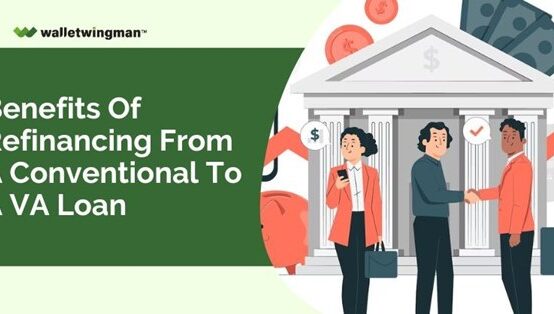When using a VA loan to buy a house, you will likely encounter the term “title insurance” at some stage. Title insurance is a central component of the mortgage process for VA and FHA loans.
But what is title insurance exactly? Is it required for all VA loans? And what kind of protection does it provide you as a home buyer?
Let’s start with the short version before digging into the details:
When it comes to VA loans, there are two main types of title insurance: the lender’s policy and the owner’s policy. Owner’s title insurance (the main focus of this article) provides coverage for potential title defects, such as undisclosed liens, errors in public records, or ownership disputes.
What Is Title Insurance, Exactly?

Title insurance provides financial protection and compensation for the policyholder in case of title-related issues, such as undisclosed liens, ownership disputes, or errors in public records.
It doesn’t prevent someone from trying to claim ownership of your house. However, it can help mitigate the financial impact of such claims by covering legal costs and potential losses that come from defending your ownership rights.
Title insurance can be used for conventional and VA loans alike. However, the Department of Veterans Affairs technically doesn’t require these policies for VA loans. We’ll revisit this point in a moment. First, we need to make an important distinction.
There are two types of title insurance, based on who they protect:
- Lender’s Title Insurance: The lender’s policy protects the lender’s financial interest in the property. The home buyer usually pays for the lender’s title insurance policy in the form of a one-time payment rolled into the VA loan closing cost. The lender’s policy typically remains in effect until the loan is paid off.
- Owner’s Title Insurance: The owner’s policy protects the homeowner’s interest in the property. It provides coverage against any title defects or issues that may arise after the purchase, such as undisclosed liens, errors in public records, or ownership disputes. The owner’s policy is usually paid for by the home buyer as a one-time premium during the closing process.
What Do These Insurance Policies Cover?

When it comes to a first time home buyer VA loan, an owner’s title insurance policy can provide significant financial protection against specific legal actions.
According to the Consumer Financial Protection Bureau (CFPB):
“When you purchase your home, you receive a document called a deed, which shows the seller transferred their legal ownership, or ‘title’ to their home, to you. Title insurance can protect you if someone later sues you and says they have a claim against the home from before you purchased it. Legal claims could come from a previous owner’s failure to pay taxes or from contractors who say they were not paid for work done on the home before you purchased it.”
As with other forms of insurance, the coverage provided by an owner’s title insurance policy can vary depending on the type of policy being purchased. In the context of VA loans, title insurance typically protects the homeowner from the following.
- Ownership Issues: Title insurance can cover ownership disputes and claims against the property’s title. This includes situations where someone else asserts ownership rights to the property, such as undisclosed heirs or previous owners with legal claims.
- Liens and Encumbrances: It protects against undisclosed liens or encumbrances on the property’s title. These may include outstanding mortgages, unpaid taxes, judgments, or other financial obligations that could affect the property’s ownership.
- Forgery and Fraud: Title insurance provides coverage in case of forgery or fraud related to the transfer of the property’s title. This includes instances where forged documents are used to convey ownership, as well as fraudulent representations regarding the property’s history.
- Errors in Public Records: It safeguards against mistakes or discrepancies in public records that could affect the property’s title, including clerical errors, inaccurate surveys, or improperly recorded legal documents.
- Title Search and Defense Costs: In the event of a title dispute or legal challenge, title insurance covers the costs associated with defending the property’s title in court. This includes legal fees, court costs, and other various expenses incurred during the resolution process.
- Title Examination: Title examination constitutes a thorough inspection of the discovery from the title search. After the records have been examined by the trained personnel, the deeds will be scrutinized to ensure that there are no defects or encumbrances that could hinder any ownership rights.
The evaluation is carried out by a professional appraiser or a title company with significant experience in property law matters so that the risks that can arise due to the title are carefully studied.
Title searchers carefully study historical records by means of titles, deeds, surveys, and anything of that sort. They are in charge of checking the title quality. Their expertise enables them to reveal any hidden defects that may affect the property’s marketability or the purchaser’s property titles. Thus, they provide relevant information to assist in the underwriting process.
- Underwriting: The process of underwriting in communication with title insurance includes examining and going through the latest title risks that can be linked to the issuing of title insurance.
The title insurance firm will analyze the title examination findings to determine the nature of the risk and select the corresponding premium. This is done through an evaluation of several elements, such as the location of the property, possible defects or liens, other laws, and ordinances that may affect the property and thus affect its value.
Underwriters, the experts, use these factors as a basis to come up with their premise to quantitatively measure the probability of a future title claim. From the title search report, the agents determine the conditions of the policy and underwrite the scope of coverage. They make it possible for it to cover any existing title issues.
- Closing: Closing, usually called settlement, is the last step in the real estate transaction process, where all the parties to the sale gather together to complete the transaction and transfer the ownership of the property.
The closing is attended by the buyer and the seller, as well as the real estate agents, lenders, and title insurance representatives who pass on the agreed amount and sign the documents.
It typically closes at a title county, attorney’s office, or any other neutral location all parties have agreed on. The concluding steps involve verifying the correctness of the documented closing, distributing funds paid, recording the deal with the concerned authority, and finally transferring the possession from the seller to the buyer.
Again, all of this can vary depending on the type of coverage you purchase. So be sure to read the fine print and ask plenty of questions until you understand the exact nature of your policy.
Do VA Loans Require a Title Insurance Policy?

So, do VA loans require a title insurance policy for homeowners?
The short answer is no; these policies are not an official requirement for VA-backed mortgage loans. However, your lender will probably require at least a lender’s title insurance policy, and you should consider purchasing your coverage as well.
On its website, the U.S. Department of Veterans Affairs explains that they do not “require a lender making a VA loan or the veteran-borrower to obtain title insurance. The lender may apply its title insurance requirements to VA loan transactions.”
Benefits It Provides to VA Loan Borrowers

At this point, you might be wondering:
“If title insurance is not required for a VA loan refinance, why should I pay for it? It will increase the amount of money I have to pay at closing. But what do I get out of it?”
Ultimately, it’s your call. While your mortgage lender might need a lender’s title insurance policy when you take out a VA loan, the owner’s policy is usually optional. Even so, it offers a number of essential benefits.
Here are two reasons to consider an owner’s title insurance policy when using a VA loan:
- Peace of Mind: Title issues and disputes can be costly and stressful. An owner’s title insurance policy gives you peace of mind, knowing you’re protected against unexpected ownership challenges that could threaten your investment.
- Avoiding Financial Hardship: Unforeseen title problems can result in significant legal fees and even the potential loss of your home. Title insurance cost cover these and compensates you if the worst-case scenario occurs.
Even though owner’s title insurance is optional for VA loans, it can still provide an essential layer of protection for homeowners.
Conclusion
VA loan users mainly rely on title insurance as an effective tool for their house-purchasing procedures. Through its role of defending the possible issues regarding title to the premises, title insurance ensures that the interests of the homeowners and lenders are protected.
Although VA loans are attracted by providing lender’s title insurance, buyers are also advised to purchase the owner’s title insurance as a tool to guard against some risks. Knowing the value of title insurance and the options available allows borrowers to make their decisions clearly and smoothly and sail through the home-buying process.



 The VA Cash-Out Refinancing Process Explained
The VA Cash-Out Refinancing Process Explained  Benefits of Refinancing From a Conventional to a VA Loan
Benefits of Refinancing From a Conventional to a VA Loan  Occupancy Rules For Homes Purchased With A VA Loan
Occupancy Rules For Homes Purchased With A VA Loan  How Soon Can I Use Another VA Loan Again?
How Soon Can I Use Another VA Loan Again? 